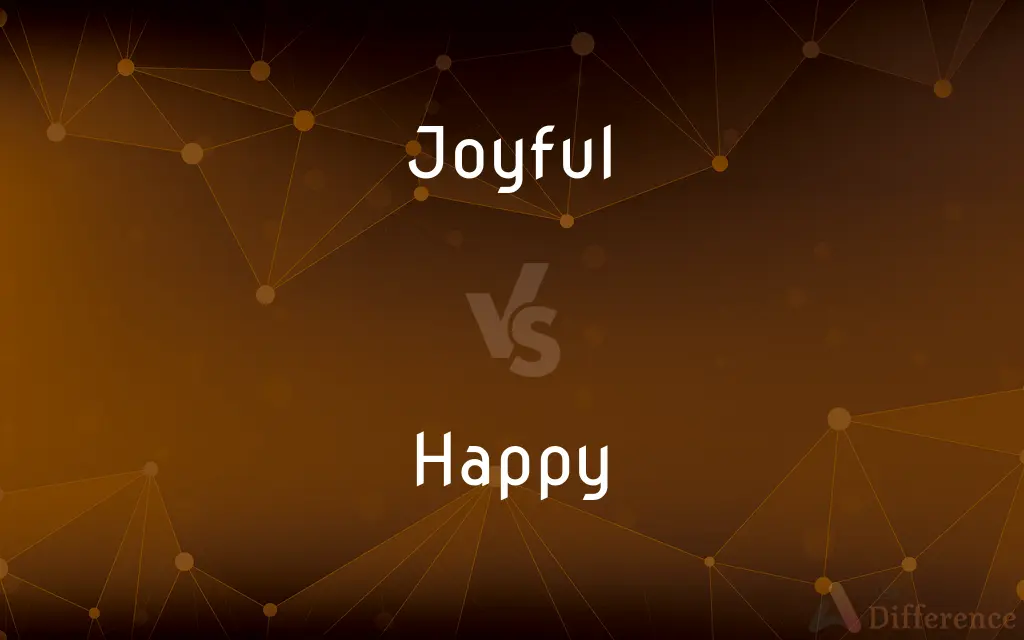Joyful vs. Happy — What's the Difference?
By Fiza Rafique & Maham Liaqat — Updated on April 8, 2024
Joyful describes a deep, often spiritual or profound happiness, while happy denotes a general state of well-being or contentment, influenced by external circumstances.

Difference Between Joyful and Happy
Table of Contents
ADVERTISEMENT
Key Differences
Joyfulness is a state that is often described as deeper and more profound than happiness. It is usually associated with an inner feeling of contentment that isn't solely dependent on external conditions. Joy can emanate from a sense of fulfillment, spiritual well-being, or the appreciation of life's beauty, making it a more constant and stable feeling. On the other hand, happiness is typically tied to specific situations, events, or conditions. It is a positive emotion that reflects a general state of well-being or satisfaction with one's circumstances. Happiness can fluctuate more frequently, changing with life's ups and downs.
While joyfulness is considered more enduring and is often linked to an individual's overall outlook on life and existential satisfaction, happiness might be seen as more fleeting, easily influenced by immediate surroundings or recent events. For instance, achieving a personal goal or experiencing a positive life event can make someone happy, but joyfulness stems from a deeper sense of purpose or connection with others, which isn't as easily swayed by external factors.
Joy can also be found in the midst of adversity, reflecting a state of peace and contentment despite challenging circumstances. This quality of joyfulness demonstrates its resilience and the fact that it is not merely the absence of sadness or difficulty but a positive presence in one's life. In contrast, happiness might be temporarily overshadowed by negative experiences until positive circumstances return.
Both joy and happiness contribute significantly to an individual's quality of life, but the paths to experiencing them can differ. Joyfulness might require a more deliberate reflection on one's values, beliefs, and relationships, while happiness can be more directly influenced by engaging in enjoyable activities, improving one's life situation, or changing one's mindset about certain aspects of life.
Comparison Chart
Definition
A deep, profound state of happiness.
A state of well-being or contentment.
ADVERTISEMENT
Dependency
Less dependent on external circumstances.
Often influenced by external situations or events.
Duration
Considered more enduring and stable.
Can be fleeting, changing with circumstances.
Source
Inner fulfillment, spiritual well-being, appreciation of life.
Specific situations, achievements, or conditions.
Presence in Adversity
Can be present even in difficult times.
May be overshadowed by negative experiences.
Compare with Definitions
Joyful
It is characterized by a lasting sense of contentment.
Their joyful community life was not dependent on material wealth.
Happy
Happiness is influenced by external pleasures and achievements.
Winning the award made him exceptionally happy.
Joyful
Joyfulness can be experienced even in hardship.
Despite the challenges, she found joy in the small victories.
Happy
Happy describes a contented state of being.
The surprise party made her incredibly happy.
Joyful
Joyful signifies a profound inner happiness.
She felt a joyful sense of peace during the quiet morning hours.
Happy
It is often a response to positive events.
He was happy to hear the good news about his friend.
Joyful
Joyfulness transcends temporary emotional states.
His joy was palpable, even when external circumstances were tough.
Happy
It relates to satisfaction with one's circumstances.
They were happy with their new home's peaceful location.
Joyful
It's often tied to spiritual or existential fulfillment.
His joyful demeanor was rooted in his deep faith.
Happy
Happiness can fluctuate with life's ups and downs.
Her happiness grew as she embarked on the new project.
Joyful
Feeling, causing, or exhibiting joy.
Happy
Feeling or showing pleasure or contentment
They are happy to see me doing well
Melissa came in looking happy and excited
We're just happy that he's still alive
Joyful
Feeling or causing joy.
Happy
Fortunate and convenient
He had the happy knack of making people like him
Joyful
Full of joy; having or causing joy; very glad; as, a joyful heart.
My soul shall be joyful in my God.
Sad for their loss, but joyful of our life.
Happy
Inclined to use a specified thing excessively or at random
They tended to be grenade-happy
Joyful
Full of or producing joy;
Make a joyful noise
A joyful occasion
Happy
Enjoying, showing, or marked by pleasure, satisfaction, or joy
A happy child.
The happiest day of my life.
Joyful
Full of high-spirited delight
Happy
Cheerful; willing
Happy to help.
Joyful
Full of or suggesting exultant happiness;
A joyful heart
A joyful occasion
The joyous news
Joyous laughter
Happy
Characterized by good luck
A happy sequence of events.
Happy
Being especially well-adapted; felicitous
A happy turn of phrase.
Happy
Characterized by a spontaneous or obsessive inclination to use something. Often used in combination
Trigger-happy.
Happy
Enthusiastic about or involved with to a disproportionate degree. Often used in combination
Money-happy.
Clothes-happy.
Happy
Having a feeling arising from a consciousness of well-being or of enjoyment; enjoying good of any kind, such as comfort, peace, or tranquillity; blissful, contented, joyous.
Music makes me feel happy.
Happy
Experiencing the effect of favourable fortune; favored by fortune or luck; fortunate, lucky, propitious.
Happy
Content, willing, satisfied (with or to do something); having no objection (to something).
Are you happy to pay me back by the end of the week?
Yes, I am happy with the decision.
Happy
(Of acts, speech, etc.) Appropriate, apt, felicitous.
A happy coincidence
Happy
(in combination) Favoring or inclined to use.
Slaphappy, trigger-happy
Happy
Dexterous, ready, skilful.
Happy
Implying 'May you have a happy ~' or similar; used in phrases to wish someone happiness or good fortune at the time of a festival, celebration, or other event or activity.
Happy birthday!, Happy Fourth of July!, Happy anniversary!, Happy job-hunting!
Happy
A happy event, thing, person, etc.
Happy
Often followed by up: to become happy; to brighten up, to cheer up.
Happy
Often followed by up: to make happy; to brighten, to cheer, to enliven.
Happy
Favored by hap, luck, or fortune; lucky; fortunate; successful; prosperous; satisfying desire; as, a happy expedient; a happy effort; a happy venture; a happy omen.
Chymists have been more happy in finding experiments than the causes of them.
Happy
Experiencing the effect of favorable fortune; having the feeling arising from the consciousness of well-being or of enjoyment; enjoying good of any kind, as peace, tranquillity, comfort; contented; joyous; as, happy hours, happy thoughts.
Happy is that people, whose God is the Lord.
The learned is happy Nature to explore,The fool is happy that he knows no more.
Happy
Dexterous; ready; apt; felicitous.
One gentleman is happy at a reply, another excels in a in a rejoinder.
Happy
Enjoying or showing or marked by joy or pleasure or good fortune;
A happy smile
Spent many happy days on the beach
A happy marriage
Happy
Experiencing pleasure or joy;
Happy you are here
Pleased with the good news
Happy
Marked by good fortune;
A felicitous life
A happy outcome
Happy
Satisfied; enjoying well-being and contentment;
Felt content with her lot
Quite happy to let things go on as they are
Happy
Exaggerated feeling of well-being or elation
Happy
Well expressed and to the point;
A happy turn of phrase
A few well-chosen words
A felicitous comment
Common Curiosities
Can someone be joyful without being happy?
Yes, someone can be joyful even in moments when they are not feeling happy, as joyfulness is a deeper state that doesn't rely solely on external circumstances.
How can I cultivate joyfulness?
Cultivating joyfulness often involves deeper reflection on your values, fostering meaningful relationships, and finding purpose in life, regardless of external circumstances.
Can external events trigger joy?
While joy is less dependent on external events, profound or spiritually significant experiences can certainly trigger a feeling of joyfulness.
Is happiness just a temporary emotion?
While happiness can fluctuate and may seem temporary, it's a vital part of experiencing a fulfilling life and can lead to lasting well-being when integrated into an overall positive life perspective.
Do cultural factors influence happiness and joyfulness?
Yes, cultural factors can influence how happiness and joyfulness are experienced and expressed, including what sources are valued for eliciting these feelings.
Is happiness less important than joyfulness?
Both are important for well-being; happiness relates to immediate contentment, while joyfulness is a more profound, enduring state. Neither is less important; they contribute to well-being in different ways.
Can pursuing happiness lead to joyfulness?
Pursuing happiness through meaningful activities and relationships can contribute to a deeper sense of joyfulness, especially if these pursuits align with one's deeper values and sense of purpose.
How do children experience joy and happiness?
Children often experience joy and happiness more spontaneously and vividly, responding with happiness to immediate pleasures while also showing profound joy in simple moments.
How does joyfulness affect health?
Joyfulness, like happiness, can have a positive effect on health, improving mental well-being, reducing stress, and potentially contributing to physical health through a positive outlook and healthier lifestyle choices.
Is joyfulness a choice?
While external circumstances can challenge one's state of joy, many believe that joyfulness can be cultivated through a choice to focus on gratitude, purpose, and positive relationships.
Share Your Discovery

Previous Comparison
Delft vs. Province
Next Comparison
Shaft vs. TreeAuthor Spotlight
Written by
Fiza RafiqueFiza Rafique is a skilled content writer at AskDifference.com, where she meticulously refines and enhances written pieces. Drawing from her vast editorial expertise, Fiza ensures clarity, accuracy, and precision in every article. Passionate about language, she continually seeks to elevate the quality of content for readers worldwide.
Co-written by
Maham Liaqat














































